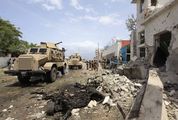
SOUTH Africa desperately needed not to lose their match against Ethiopia on Sunday. With four games played in group A of the World Cup qualifiers, Bafana Bafana had eight points from two wins and two draws.
A win would have seen Bafana leapfrog Ethiopia to the top of the group ahead of the final match against Botswana. A draw would not have been a bad result either. The Black Lions needed a win to secure a position in the next round of qualifiers.
Bafana Bafana played with great spirit, a far cry from the team that had played out a limp 1-1 draw against the Black Lions just a year ago in Rustenburg. The sacking of Pitso Mosimane and the appointment of Gordon Igesund invigorated the team and produced results. Before the loss against Ethiopia, the national side had only lost once, in a friendly against Norway, in 10 games. In that time, Malawi, Lesotho and the Central African Republic were at the receiving end of handsome losses. In the African Cup of Nations, South Africa finished at the top of their group. There was, at last, an inkling of momentum.
Then came that tragic moment in this weekend’s match when Reneilwe Letsholonyane missed a glorious opportunity to pull ahead by two goals to one, and it descended into a farce when Bernard Parker punched a spectacular header into his own side’s net.
A close loss at this stage hurts enough. That we were sunk by an own goal turns it into cruel and unusual punishment. We didn’t deserve this.
The outpouring of disappointment and fury from the public was understandable. The nation has long lost patience with Bafana Bafana’s failures. But it would be a blunder to think that the team and Igesund didn’t feel it even more painfully. The after-match interviews were painful to watch, as everyone was clearly distressed.
"Honestly, we couldn’t ask for the boys to give more," Igesund said. And he is right. The boys played with passion and determination, and were cruelly cheated by an Ethiopian side that handed out more bone-crunching tackles in a single match than any team should have ever have to face, with a referee seemingly unable to stamp his authority on the game. Not that this will count for anything in the final telling.
My fear is that the temptation will be to react to this setback by going back to the drawing board once again instead of allowing Igesund to continue his good work. At the time of his appointment, South African Football Association president Kirsten Nematandani said the national manager was on a two-year contract and had to get the team to the semifinals of Afcon and qualify for the 2014 World Cup in Brazil. He has not achieved either of those things, and he will have to explain why in painful detail.
Maybe the goals that were set for him were unrealistic, but sacking him would be extreme. A call to do so is to say the team have made no progress whatsoever in the past year.
We can’t keep calling for Bafana to be better yet undermine the conditions needed for success. It would be better to allow Igesund to continue building his squad and focus on qualifying for the next Afcon tournament.
The great news is that the most important work for the future of Bafana Bafana is being put in place via the South African Development Agency. An ambitious seven-point plan, based on the system that reinvigorated the German national side, is being implemented with a view to place South Africa in the quarterfinals of the 2022 World Cup, and beyond. It is an expensive plan that will rely heavily on corporate support to work, but it is what the country needs to solve the never-ending Bafana quandary.
In the meantime, have a little sympathy for Igesund, Parker and the rest of the Bafana squad. They didn’t set out to disappoint the nation.






















Post a comment